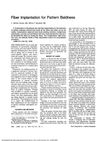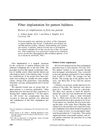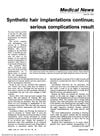 20 citations,
January 1979 in “JAMA”
20 citations,
January 1979 in “JAMA” Fiber implantation for baldness is not recommended because it causes many problems and doesn't work well.
 15 citations,
March 1981 in “Journal of The American Academy of Dermatology”
15 citations,
March 1981 in “Journal of The American Academy of Dermatology” Fiber implantation for pattern baldness was largely unsuccessful with many complications and is not recommended.
January 2023 in “Springer eBooks”  2 citations,
January 1980 in “Archives of Dermatology”
2 citations,
January 1980 in “Archives of Dermatology” The author suggests changing "telogen effluvium" to "telogen defluxion" for hair loss terminology.
 3 citations,
August 2003 in “International Journal of Cosmetic Surgery and Aesthetic Dermatology”
3 citations,
August 2003 in “International Journal of Cosmetic Surgery and Aesthetic Dermatology” Fiber implants effectively treat permanent hair loss with over 85% success and minimal complications.
 1 citations,
February 2021 in “Journal of Dermatological Treatment”
1 citations,
February 2021 in “Journal of Dermatological Treatment” Artificial hair implants can quickly improve looks and life quality, but they have risks like infection and early fiber loss, so more research is needed to confirm their safety and effectiveness.
 August 2003 in “International Journal of Cosmetic Surgery and Aesthetic Dermatology”
August 2003 in “International Journal of Cosmetic Surgery and Aesthetic Dermatology” Fiber implants effectively treat permanent hair loss with few complications.
 1 citations,
January 1980 in “Archives of Dermatology”
1 citations,
January 1980 in “Archives of Dermatology” Syphilis chancres can be atypical, and fiber implantation for baldness is risky and often fails.
 9 citations,
November 2008 in “Journal of Cosmetic Dermatology”
9 citations,
November 2008 in “Journal of Cosmetic Dermatology” Artificial hair implantation is generally safe and can restore hair when other treatments fail, but some patients may experience side effects.
 8 citations,
June 1979 in “JAMA”
8 citations,
June 1979 in “JAMA” Synthetic hair implants can cause severe infections and are risky.
 10 citations,
January 2007 in “Dermatologic Surgery”
10 citations,
January 2007 in “Dermatologic Surgery” Artificial hair fibers help treat scalp scars with few complications and a 20% yearly fiber fall rate.
 January 2007 in “Dermatologic Surgery”
January 2007 in “Dermatologic Surgery” Artificial hair fibers help treat scalp scars with few complications and a 20% yearly fiber fall rate.
 3 citations,
April 1981 in “PubMed”
3 citations,
April 1981 in “PubMed” Hair implants can cause infections, allergic reactions, itching, and scarring.
 4 citations,
February 2020 in “Journal of Cosmetic Dermatology”
4 citations,
February 2020 in “Journal of Cosmetic Dermatology” Synthetic hair implants can cause severe scalp problems and removing them improves conditions; natural hair transplants are safer and more effective.
 January 2018 in “Journal of cosmetology & trichology”
January 2018 in “Journal of cosmetology & trichology” The Automatic Biofibre® Hair Implant is a fast and effective hair restoration method that provides immediate cosmetic benefits and good results in over 90% of cases, but requires proper care to avoid complications.
 1 citations,
March 1985 in “Head & neck surgery”
1 citations,
March 1985 in “Head & neck surgery” Hair-bearing punch grafting effectively repaired damage from artificial hair implants.
 3 citations,
January 2018 in “Open Access Macedonian Journal of Medical Sciences”
3 citations,
January 2018 in “Open Access Macedonian Journal of Medical Sciences” Implant safely and effectively treats hair loss.
1 citations,
January 1997 in “European journal of plastic surgery” Tissue expansion can fix scalp issues from hair implants.
2 citations,
June 1979 in “JAMA” Synthetic hair implants are dangerous and can cause severe infections.
 7 citations,
December 2017 in “Open Access Macedonian Journal of Medical Sciences”
7 citations,
December 2017 in “Open Access Macedonian Journal of Medical Sciences” Biofibre® hair implants are safe and effective for alopecia when proper procedures are followed, with high patient satisfaction.
 1 citations,
June 2018 in “The Journal of Dermatology”
1 citations,
June 2018 in “The Journal of Dermatology” A man got heart infection from scalp infection caused by artificial hair implants.
 5 citations,
February 2012 in “Aesthetic Plastic Surgery”
5 citations,
February 2012 in “Aesthetic Plastic Surgery” A man developed skin cancer on his scalp after multiple artificial hair grafts.
 April 1981 in “Postgraduate Medicine”
April 1981 in “Postgraduate Medicine” In 1981, the punch graft technique was the main method for hair transplantation, and medical treatments for baldness were not very effective.
 3 citations,
August 2017 in “PubMed”
3 citations,
August 2017 in “PubMed” A man got a scalp infection from synthetic hair implants because the procedure wasn't done by a doctor and was poorly managed.
 10 citations,
January 2010 in “International Journal of Trichology”
10 citations,
January 2010 in “International Journal of Trichology” Synthetic hair fibers for hair restoration were controversial in 2009 due to health risks and lack of support from the International Society of Hair Restoration.
 7 citations,
October 2011 in “International Surgery”
7 citations,
October 2011 in “International Surgery” In 2011, hair restoration was a specialized field in plastic surgery, using techniques like "Ultrarefined follicular unit hair transplantation" to minimize scarring and promote hair growth, with future treatments like stem cell therapy and hair cloning still being tested.
 77 citations,
March 2001 in “Clinics in Dermatology”
77 citations,
March 2001 in “Clinics in Dermatology” Androgenetic alopecia involves genetics, hormones, and can be treated with medications or surgery.
 62 citations,
January 2003 in “Dermatology”
62 citations,
January 2003 in “Dermatology” Sunlight worsens hair loss; protect scalp.
 19 citations,
January 2015 in “Current problems in dermatology”
19 citations,
January 2015 in “Current problems in dermatology” Ultraviolet rays damage hair, smoking may cause hair loss, and good nutrition is important for hair health, but genetics mainly decide hair thickness.
 1 citations,
March 2009 in “Hair transplant forum international”
1 citations,
March 2009 in “Hair transplant forum international” The author believes that in hair restoration, creating an illusion of coverage is more important than perfection, and managing expectations and improving average results should be prioritized over promising unrealistic outcomes.



























